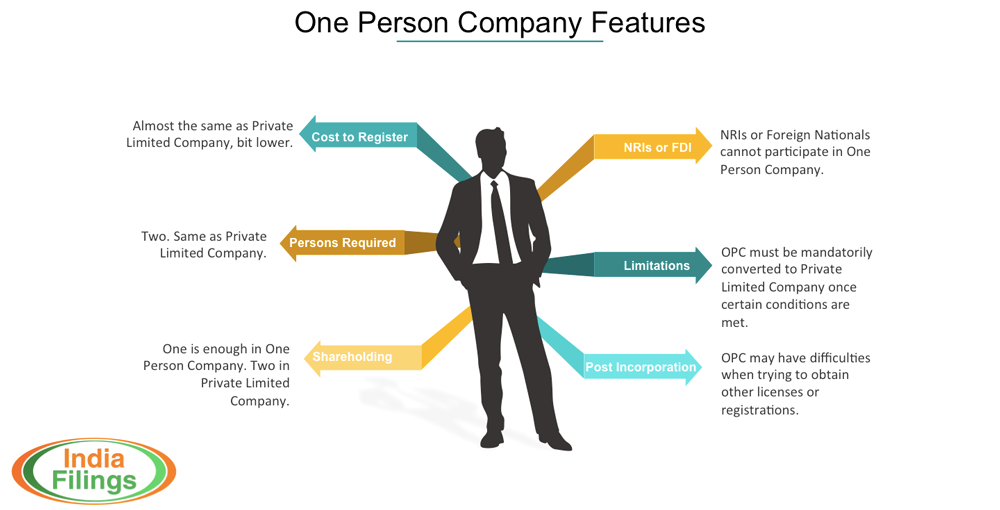 Last updated: July 17th, 2023 9:19 AM
Last updated: July 17th, 2023 9:19 AM
One Person Company vs Private Limited Company
One Person Company registration has been recently introduced in India to promote business enterprises that are owned and managed by a single Entrepreneur. Corporate entities like Limited Liability Partnership, Private Limited Company and Limited Company require two or more people to partner. However, a OPC allows for a single individual to own and manage the business. One Person Company is therefore a viable option for those looking to start an unregistered Proprietorship. In this article, we compare starting and managing a One Person Company vs Private Limited Company in India.
[caption id="attachment_2265" align="aligncenter" width="719"] One Person Company Features Infographic
One Person Company Features Infographic
Cost of Registration
The cost for registration of One Person Company is lower than the cost of registration of a Private Limited Company. The all inclusive cost for registration of a One Person Company through IndiaFilings.com is Rs.15,000/- while the all inclusive cost for registration of a Private Limited Company through IndiaFilings.com is Rs. 16,000/-.
Number of Person Required to Incorporate
To incorporate a One Person Company, two person are required. The Director of the One Person Company and Nominee Director. The Nominee Director is responsible for management of the Company in case the Director is not able to execute his functions. To incorporate a Private Limited Company, two persons are required.
Board of Directors
There is not concept of Board of Directors in a One Person Company as the entity can be managed by a single person. The concept of Annual General Meeting and Board Meetings is also not applicable for a One Person Company. A private limited company has a Board of Directors comprising of a minimum of two Directors to a maximum of seven Directors.
Shareholding
The 100% shares of a One Person Company can be held by a single person. A private limited company must have a minimum of two shareholders. Therefore, 100% of the shares of a private limited company cannot be held by a single person.
NRI or Foreign Nationals
Only Indian Citizens and Indian Nationals are allowed to start a One Person Company. Private limited company can be started and managed by NRIs and Foreign Nationals. 100% FDI is available in Private Limited Company for a number of sectors.
Compliance Requirements
The compliance requirements of a One Person Company and Private Limited company are almost similar. Both, One Person Company and Private Limited Company are required to file their annual returns with the Ministry of Corporate Affairs and their Income Tax Returns with the Income Tax Department. Both One Person Company and Private Limited Company are also required to get their account audited each year.
Limitations
A One Person Company must be mandatorily converted into a Private Limited Company if the annual sales turnover exceeds Rs.2.00 crores or the paid up capital of the One Person Company exceeds Rs.50 lakhs. A private limited company has no such limitations and no requirement for mandatory conversion under any circumstances.
Post Incorporation
One Person Company has been recently introduced in India. Still some Governmental Departments and Banks have not updated their systems or forms and procedures to handle One Person Company. Therefore, there may be difficulties in obtaining certain licenses or registration after incorporation of a One Person Company.
Private Limited Company has been around for decades and is the most popular type of corporate entity in India. Therefore, the process for obtaining other licenses and registration, post incorporation of a private limited company will be easy.
Conclusion
One Person Company are very similar in nature on many fronts like cost of incorporation, number of person required to incorporate and compliance. However, when it comes to limitations, One Person Company has a lot more limitations on foreign promoter participation, mandatory conversion to private limited company, etc., Therefore, IndiaFilings recommends that Entrepreneurs incorporate a Private Limited Company instead of a One Person Company until the concept of One Person Company is well established in India.
Popular Post

In the digital age, the convenience of accessing important documents online has become a necessity...

The Atalji Janasnehi Kendra Project that has been launched by the Government of Karnataka...

The Indian Divorce Act governs divorce among the Christian couples in India. Divorce...

When an individual has more than a single PAN card, it may lead to that person being heavily penalised, or worse,...

Employees Provident Fund (PF) is social security and savings scheme for employee in India. Employers engaged...


